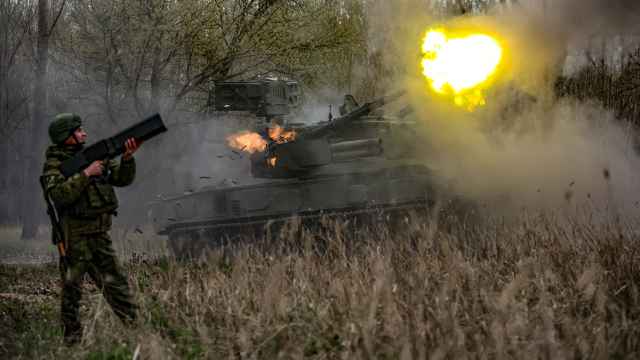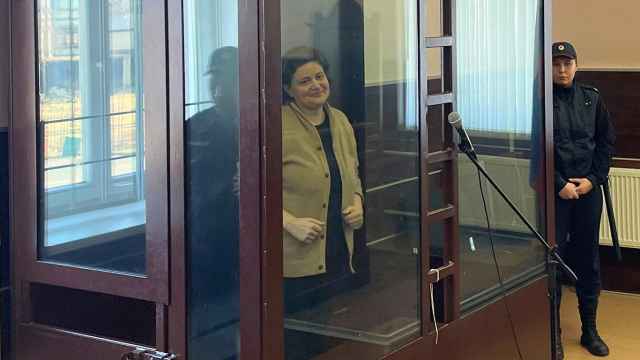Western companies are a major force behind the spread of corporate ecological consciousness in Russia, as they try to apply their global standards in local operations.
Green practices that they breed in the country range from responsible timber harvesting to recycling of used appliances and packaging.
"There is progress in Russia," said Yelena Kopylova, a World Wildlife Fund representative. "The steps may not be as large as we would like, but awareness and interest are growing, and more and more companies are joining in."
"Western companies are playing a leading role," she added.
Kimberly-Clark, which opened a plant near Moscow in June, will promote responsible management of raw materials in Russia, Cecilia Ortlieb, strategy leader for global sustainability, said at a recent round-table discussion.
The U.S.-based producer of personal care products is the world's largest buyer of paper pulp, and it exerts a powerful effect on the global market by insisting on having certified product, Ortlieb said. The Russian plant so far imports raw materials to make diapers, she said.
Green companies can seek certification from the Forest Stewardship Council for their timber-based products such as paper pulp. The council gives its approval to companies that meet its standards for responsible harvesting of trees and handling of raw materials along the chain of supply. A total of 122 such certificates have been granted to Russian companies, mostly pulp and paper mills, since 2005.
Tetra Pak Russia gets most of the paperboard to produce its packaging in Russia from a local Forest Stewardship Council-certified supplier, International Paper Svetogorsk. The packaging producer is now on a mission to recycle more of its products, said Alexander Barsukov, the company's vice president for environmental conservation.
Recycling of Tetra Pak packaging is not difficult or expensive, but its recycling in Russia began only three years ago, later than in many other countries, he said. The number of recyclers willing to work with Tetra Pak material is limited, but collecting that material is the biggest challenge, Barsukov said.
As impediments to recycling in Russia, Barsukov noted a lack of a legislative basis and tax incentives for the activity. Systematic collection of material is a problem, and there are few specialists in the field, he said. Banks are hesitant to loan money to recyclers because of the limited scale of their operations, he added.
Those operations are expanding nonetheless, and foreign companies are in on the act. A tender for a public-private garbage recycling project in St. Petersburg received bids from three foreign companies and the Russian subsidiaries of two others. Austria's Strabag and a Greek consortium are the remaining contenders for the $420 million project. The winner of the tender is expected to be announced on Nov. 26, according to RIA-Novosti.
The Swiss company TDF Ecotech entered into negotiations with the area of Kavkazskiye Mineralniye Vody last year for a $126 million recycling plant, said Andrei Zodin, head of the company's Russian office. The fate of the project depends on local funding, he said.
"We are optimistic about the Russian market," Zodin said. "But there are problems with legislation and budgeting in some regions."
Foreign digital equipment makers also extend their international recycling programs to Russia. The Russian Dell web site has a "recycling" button on its home page that redirects the user to the U.S. web site's English-language information about its American recycling program. But their service center in Moscow was prepared to accept old computers at their office when a reporter called.
According to the Philips Russia office, that company's products can be dropped off at any of 180 service centers nationwide for recycling by local companies with which Philips has contracts.
McDonald's Russia said it uses “green technology” in building and managing restaurants. The Russian restaurants comply with the so-called silver level of ecology, which is the required minimum for all new restaurants around the world, said spokeswoman Nina Prasolova.
The silver standard includes the exclusive use of energy-saving lighting, automatic faucets in the restrooms, movement sensors in service areas and restrooms to turn lights off and on and light sensors to turn lighting off outside and near windows, she said. This standard has been in place in Russia since 2009.
In January, McDonald's Russia plans to introduce elements of the gold standard: use of heat from kitchen equipment to warm the dining area, transition to a new generation of air conditioners with much higher efficiency and installation of a computer system for central management of the building's energy system, Prasolova said.
The platinum standard includes more innovative measures such as solar batteries and wind generators to provide electricity and collection of rainwater to use for cleaning outlying areas around the restaurant, she said.
“Unfortunately, it is difficult to apply the platinum standard in Russia, partially because of the climate,” Prasolova said by e-mail. “Therefore, elements of the platinum standard will be implemented only selectively, possibly in the south of the country."
McDonald's also uses its influence over partners for the good of the Earth, said another company spokeswoman, Olga Shilkova.
A spokeswoman for French retailer Auchan, which has ecologically friendly policies internationally, said she couldn't comment on the company's Russia operations in the area. French DIY suppliers Castorama and Leroy Merlin could not be reached for comment.
The stated efforts by the Western companies to keep up their green policies in Russia didn't win recognition with all environmentalists. For one, Greenpeace representative Ivan Blokov was unimpressed.
"I don't see any difference between Western or Western-oriented companies and Russian companies," he said, adding that Western companies are generally quite willing to relax their standards in Russia when they see that it is possible.
Russian companies are coming around slowly to ecological awareness.
Lineprint is the only Forest Stewardship Council-certified printer in Russia, receiving the certificate in March. The company's certification indicates that the major producer of brochures, calendars and notebooks uses only FSC-certified paper.
"The management decided to seek certification because it corresponds to a certain level of social responsibility," said Lineprint production manager Yevgeny Zubov.
He said that certification has had an influence on business.
"People it is important to and companies converting to a green office contact us," he said.
A Message from The Moscow Times:
Dear readers,
We are facing unprecedented challenges. Russia's Prosecutor General's Office has designated The Moscow Times as an "undesirable" organization, criminalizing our work and putting our staff at risk of prosecution. This follows our earlier unjust labeling as a "foreign agent."
These actions are direct attempts to silence independent journalism in Russia. The authorities claim our work "discredits the decisions of the Russian leadership." We see things differently: we strive to provide accurate, unbiased reporting on Russia.
We, the journalists of The Moscow Times, refuse to be silenced. But to continue our work, we need your help.
Your support, no matter how small, makes a world of difference. If you can, please support us monthly starting from just $2. It's quick to set up, and every contribution makes a significant impact.
By supporting The Moscow Times, you're defending open, independent journalism in the face of repression. Thank you for standing with us.
Remind me later.





